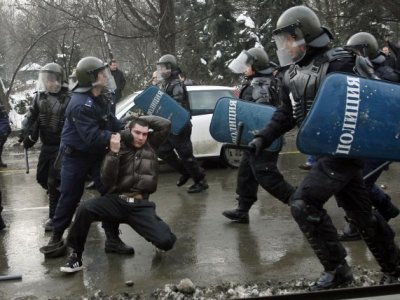 Thousands of police officers marched in the Bulgarian capital on Sunday to press the government raise their wages by 50 percent and provide better working conditions.
Thousands of police officers marched in the Bulgarian capital on Sunday to press the government raise their wages by 50 percent and provide better working conditions.
The poorest European Union nation has seen a series of protests from farmers, students, green activities and steel workers, demanding measures against the global economic crisis, better living standards and a crack down on rampant corruption.
Nearly 6,000 police officers from across the country rallied in central Sofia, waving the national flag and chanting “Bulgaria”. They dumped a black coffin, which had a banner inside reading “Interior Ministry”, in front of parliament.
“This is a way to make the Bulgarian and European public aware of our situation,” said Valentin Popov of the newly established police trade union. “Our demands have not been fully satisfied so far.”
Earlier this week, Interior Minister Michail Mikov decided to raise police salaries by 5 percent from January, saying a 50 percent pay rise was impossible during times of crisis. The wage hike came after Mikov cut some 1,100 jobs.
Police officers, who have staged several protests in the past three months, say they work in appalling conditions, often without enough funds to buy petrol for the patrol cars.
They also say low salaries erode security in the Black Sea nation and prevents them from ensuring a strict rule of law, one of the criticisms Brussels has against Sofia.
Opinion polls show a majority of Bulgarians rate police officers as some of the most corrupt in the Balkan country along with magistrates, taxmen and doctors.
The EU has punished Bulgaria for failing to tame organised crime and chronic corruption by freezing millions in EU aid.
The Socialist-led government is under growing pressure before parliamentary elections due in June or July to step up reforms and act against the economic downturn in the country of 7.6 million, where the average monthly pay is about 250 euros.
The protests have not attracted large numbers and do not threaten the coalition government so far, observers say, but they have further cut support for the ruling Socialists. Some 75-80 percent of Bulgarians say they want the government to go.
 Eurasia Press & News
Eurasia Press & News
